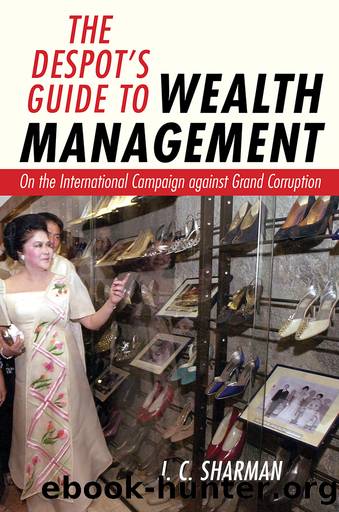The Despot's Guide to Wealth Management: On the International Campaign Against Grand Corruption by J. C. Sharman

Author:J. C. Sharman [Sharman, J. C.]
Language: eng
Format: epub
Tags: International Relations, International, General, Political Science, Political Process, Law, Corruption & Misconduct
ISBN: 9781501708435
Google: boxdDgAAQBAJ
Goodreads: 32895316
Publisher: CornellUP
Published: 2017-03-07T00:00:00+00:00
The Arab Spring revolutions illustrate the new expectation that stolen assets held abroad should be returned to victim countries, as this search came to the fore of the international agenda. It stimulated the greatest effort so far to hold kleptocrats accountable by targeting their ill-gotten wealth abroad. This included a range of unilateral and multilateral responses, for example, United Nations asset freezes and financial sanctions; the asset recovery and corruption focus of the G8 after its summit in Deauville, France, in May 2011; and the creation of the G20 Anti-Corruption Working Group at around the same time. High hopes that the Arab Spring would lead to a general transition to democracy were dashed by the outbreak of civil wars and the return to authoritarianism. In part as a result of these broader political reverses, the hunt to find and return Arab kleptocratsâ loot has also proved a disappointment. The obstacles and frustrations encountered are highly instructive in showing the limited effectiveness of any global regime premised on returning stolen wealth from overseas hiding places, as opposed to preventing such wealth from entering foreign financial systems in the first place. While part of this story has been told in the chapter on Switzerland, Britainâs experience crucially illustrates both its importance as a host for corruption funds and how the government responded to earlier failures in attempting to strengthen measures to counter kleptocracy.
In the immediate aftermath of the demonstrations that led to the overthrow of the Tunisian and Egyptian regimes in early 2011, many foreign governments applied a series of unilateral and multilateral asset freezes. These governments sought to restrain both public and private funds, though the distinction between the two was often somewhat arbitrary, recalling the tendency of the ruling families and their cronies to privatize state assets. In Britain the freezes reflected sanctions decided at the EU and UN level.
Following these initial asset freezes, the first round of requests for legal assistance from Egypt were an early indication of the problems to come. The attitude of the Egyptian government was that the Mubarak family and its close associates were manifestly guilty of corruption, and so foreign governments like the United Kingdom, the United States, and Switzerland should quickly find these assets and hand them back.102 The heady rhetoric from British and other governments in support of asset recovery may have contributed to the impression that the process could be this easy, much like the hopelessly optimistic estimate of the Philippine government in 1986 that recovering the Marcos assets should be possible within twelve months.103 While beginning trials against Mubarak and some of his closest associates for corruption and human rights abuses at home, the Egyptian government fired off requests to foreign governments for help in tracing, freezing, and repatriating stolen wealth. Evidencing the usual tendency for unsubstantiated estimates about the sums at stake to escalate almost without limit, guesses as to the Mubarak clanâs stolen wealth ranged from $1 billion to an incredible $70 billion (compared with guesses of $3â5 billion for those associated with Ben Ali and $30â80 billion for Gaddafi).
Download
This site does not store any files on its server. We only index and link to content provided by other sites. Please contact the content providers to delete copyright contents if any and email us, we'll remove relevant links or contents immediately.
The Trial of Pierre Laval by J. Kenneth Brody(206)
The Theory, Practice, and Interpretation of Customary International Law by Panos Merkouris Jörg Kammerhofer Noora Arajärvi(201)
An Inquiry into the Nature of Peace and the Terms of Its Perpetuation by Thorstein Veblen(197)
Rethinking Nordic Courts by Laura Ervo; Pia Letto-Vanamo; Anna Nylund(193)
Uncertain Justice: A Legal Thriller by K. Ryan Kerry(190)
Transnational Crime and Criminal Justice by Marinella Marmo Nerida Chazal(189)
Underwater Cultural Heritage and International Law by Sarah Dromgoole(189)
Putting the Tea in Britain by Les Wilson(185)
The Medallion by Alan P. Woodruff(185)
International Criminal Law in a Nutshell by Stewart David P.;(184)
A Farewell to Wars: The Growing Restraints on the Interstate Use of Force by Hans Blix(178)
Law Beyond the State by Carmen E. Pavel(176)
HPCR Manual on International Law Applicable to Air and Missile Warfare by Program on Humanitarian Policy and Conflict Research at Harvard University(175)
The Despot's Guide to Wealth Management: On the International Campaign Against Grand Corruption by J. C. Sharman(169)
The Rhetoric of Genocide by Ben Voth(167)
The Limits of International Law by Jack L. Goldsmith & Eric A. Posner(166)
Otto, Roland - Targeted Killings and International Law With Special Regard to Human Rights and International Humanitarian Law by Springer (2009)(164)
Trafficking Justice : How Russian Police Enforce New Laws, from Crime to Courtroom by Lauren A. McCarthy(162)
The Law of Non-International Armed Conflict by Sivakumaran Sandesh;(150)
